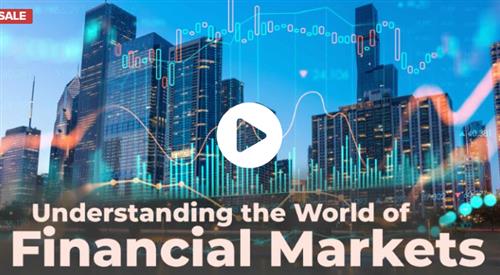
Free Download TTC - Understanding the World of Financial Markets
Released 8/2024
MP4 | Video: h264, 1280x720 | Audio: AAC, 44.1 KHz, 2 Ch
Genre: eLearning | Language: English | Duration: 12 Lessons ( 5h 9m ) | Size: 4.3 GB
Whether you're buying a home, saving for retirement, running a business, or just plain speculating, it's important to understand financial markets
Whether you're buying a home, saving for retirement, running a business, or just plain speculating, it's important to understand financial markets. These are the engines of commerce in today's world, powering economic activity and steering the flow of capital. If you want to accumulate some of that capital for yourself, there is no better preparation than plunging into the details of
The Property Market: Given the volatility of real estate, investing in property makes sense if it meets your housing goals and you have a long-term investment horizon. For generating income, REITs (Real Estate Investment Trusts) might be a better choice than outright owning property.
The Stock Market: Stocks offer liquidity, diversity, potentially high returns, and accessibility thanks to the many online trading platforms available today. The major question is whether you want to be an active investor picking your own stocks or a passive investor in mutual funds or index funds.
The Bond Market: The classic "safe" investment, bonds offer stable returns, lower risk compared to stocks, and predictable income through regular interest payments. However, the bond market can underperform and behave erratically in response to changes in the government's monetary policy.
In addition to these markets, there are the futures, options, and private equity markets, as well as emerging sectors such as virtual assets, intangibles, and ethical investments. In Understanding the World of Financial Markets, presented by award-winning instructor Dr. Connel Fullenkamp, Professor of the Practice of Economics at Duke University, all of these market types are explained in 12 crystal-clear lectures on the ins and outs of investing.
In this course, Professor Fullenkamp surveys the big picture, analyzing the underlying mechanics that drive markets, while providing insights into why they behave the way they do. He gets to the bottom of mystifying topics such as cryptocurrencies and NFTs (non-fungible tokens), tells how to gauge the strengths and weaknesses of a company, and gives you a handle on those irrational drivers of markets: greed and fear. You will come away as a more-informed investor, prepared to take advantage of opportunities that fit your goals, resources, and risk tolerance.
Get the Lowdown
Understanding the World of Financial Markets is filled with tips to help you get your bearings in different markets and to keep your mistakes to a minimum. These recommendations include
Do Your Research: This is Professor Fullenkamp's number-one rule. Understanding markets takes more than just reading hot stock tips or getting suggestions from an app. You should comprehend the deeper dynamics that move markets and drive investors. Since market trends are constantly changing, it's vital to stay up-to-date.
What Kind of Trade Is It? Following economist Riccardo Rebonato, Professor Fullenkamp contends that trades in all markets come in three basic types. They are either like selling lottery tickets, buying insurance, or rolling dice. Respective examples include stocks, futures contracts, and options purchases.
Resist FOMO: Also known as the bandwagon effect, "Fear of Missing Out" leads investors to act too soon without asking enough questions. Classic cases include speculative bubbles, "short squeezes," cryptocurrencies, and any stock that's on fire. Professor Fullenkamp proposes an antidote, FOBAI: "Fear of Being an Idiot."
A few of the markets that you will learn about are not for general investors, but, in fact, they govern how other markets work. For instance, intangible assets are some of the most valuable property that is owned by companies, but you can't buy shares in them. Instead, you should bear them in mind when deciding whether to invest in a firm. Intangible assets include patents, copyrights, and other intellectual property, along with brand names, logos, reputation, and comparable non-physical assets.
Think like a CEO
With experience studying financial markets for the better part of four decades, Professor Fullenkamp knows how to evaluate investor behavior and new financial products. Among his many insights, you will learn
Taking Advantage of Fear: Fear among investors translates into volatility in stock prices. Expectations about this volatility are measured by the VIX index; the higher the index, the more volatile or fearful the market. On the principle of going against the herd, Professor Fullenkamp counsels, "When the VIX is high, it's time to buy."
Digital Assets: Railroads are a good analogy for the hype surrounding digital assets. In the 1840s, it was clear that railroads would revolutionize transportation, but it took decades until the industry stabilized. Cryptocurrency and other virtual holdings are in a similar boat. It would be wise to let the market settle down before jumping in.
Principle-Driven Investing: ESGs (environmental, social, and governance funds) face a number of criticisms that have nothing to do with their laudatory goals. As with digital assets, there are standardization and regulatory issues yet to be worked out. As with any investment, it's best to research the product before you buy.
Professor Fullenkamp also tackles the controversial matter of executive salaries. Are CEOs worth their multi-million-dollar compensation packages? If they are truly visionary leaders, then, yes, since they can literally add billions to the bottom line. Consequently, leadership is an important consideration in evaluating a prospective stock purchase. Furthermore, thinking like a CEO is an indispensable exercise for any investor. After all, as Professor Fullenkamp points out, "I'm the CEO of my portfolio, and I have to answer to the most important set of shareholders-my family!"
What Will You Learn?
Discover the wealth of financial markets that power the economy
Get tips on how to profit from each market
Hear a clear explanation of virtual assets, including cryptocurrencies and NFTs
Compare the best strategies for investing in stocks
Learn how to turn investor fear to your advantage
Homepage
Code:
https://www.thegreatcourses.com/courses/understanding-the-world-of-financial-marketsRecommend Download Link Hight Speed | Please Say Thanks Keep Topic Live
Rapidgator
http://peeplink.in/a312b5623dbe
Fikper
rpqaz.TTC..Understanding.the.World.of.Financial.Markets.part1.rar.html
rpqaz.TTC..Understanding.the.World.of.Financial.Markets.part5.rar.html
rpqaz.TTC..Understanding.the.World.of.Financial.Markets.part4.rar.html
rpqaz.TTC..Understanding.the.World.of.Financial.Markets.part2.rar.html
rpqaz.TTC..Understanding.the.World.of.Financial.Markets.part3.rar.html
No Password - Links are Interchangeable


